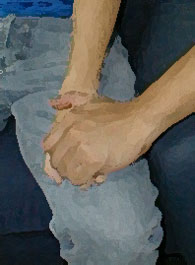"What's hard is that just one of us will be the last
To bear it all and go on living."
- Vikram Seth, How Rarely These Few Years.
Since the onset of the AIDS epidemic, more and more gay men have found themselves widowed by the death of their partners. In any relationship, the passing of a partner often plunges the bereaved person into a new world where many of the known and habitual structures of daily life disappear.

It is no exaggeration to state that widowed gay men face a much harder time when compared to their heterosexual counterparts. When a gay man passes away, the trauma and sense of loss experienced by the surviving partner is often exacerbated by mainstream society's lack of recognition of homosexual relationships and its consequent denial of the existence of a gay widower.
While the heterosexual widower who loses his partner receives at least a tacit level of social support and general condolence, gay widowers are more likely to encounter scorn, fear or even ostracism from homophobic members of society.
In articles such as Bereavement Counseling for Gay Individuals (Siegal & Hoefer) and Responses to AIDS-related Bereavement (Richmond & Ross), gay widowers are reportedly confronted with a host of other problems which includes hostility from their partners' families, exclusion from the planning of funeral arrangements or even from the service itself.
However, the most difficult problem confronting gay widowers may be the persistence of ties to the deceased and the emotional gaps that they have to live with. Given the strong emotional bonds that existed or still exist, it is no wonder that gay widowers often speak in terms of having lost an integral part of themselves after the death of their partners.
One recent gay widower confessed that the death of his lover for eight years "felt as if a part of my soul had been brutally ripped out" while another likened the situation to "being paralyzed and having to earn how to walk again."
The intense grief experienced by gay widowers can often be compounded by intense anger against a life unfairly cut short, at the deceased partner for leaving them behind or for being in the unenviable position of having to pick up the pieces and carry go on living.
To make matters worse, if the surviving gay widower is HIV positive, he has to struggle against being identified as blameworthy ("Did I pass the disease to him? Am I the cause of his death?") or with survivor-guilt issues ("Why am I still alive while my spouse died from this disease?").

As gay men go through their lives, they tend to form their own network of friends and "families" within the gay community. These gay men would have in place a viable network of supportive friends who will play a crucial role in the bereavement process by lending a shoulder to cry on or just by being there.
However, if the gay widower in question happens to be still in-the-closet, he would, more likely, be disenfranchised and isolated in his grief in comparison to another who has access to sympathy from the gay community.
As a precaution, gay men may wish to seek further protection by drawing up the necessary legal documents which leaves the surviving partner with an ironclad will to protect the latter from the indignities that may follow as shown in the following case of Xavier.
Xavier, a 40 year old professional who lost Steve, his partner of 12 years, described his unfortunate experience of having Steve's homophobic parents tell him that he would be barred from Steve's funeral.
To add insult to injury, he was further informed that he would have to move out of the apartment he and Steve had lived in for the past 12 years since the deed was owned by solely by Steve and there was not a will bequeathing the apartment to Xavier.
To quote Xavier: "Not only do I have to bear the loss of my partner, I now have to worry about not having a roof over my head".
Gay widowers should also realize that there is no right or wrong way to mourn or go about the process of moving on after the death of a loved partner. Some gay men may experience a prolonged grief reaction while others regain full momentum of their lives after a relatively short mourning process.
There is, however, a necessity to come to terms with, or at the very least, make significant emotional accommodations to the trauma associated with the passing of one's spouse in order not to be permanently crippled by it.
Rather than avoid or repress those painful feelings that must be experienced, widowed gay men must face their grief and in their own way, undergo their own bereavement process to find resolution.
Most importantly, they should seek solace and draw strength from the realization that they are never alone in their pain and suffering however isolated they may feel themselves to be.
For as Vikram Seth so poignantly expresses in his poem All You Who Sleep Tonight:
"All you who sleep tonight
Far from the ones you love,
No hand to left or right,
And emptiness above -
Know that you aren't alone.
The whole world shares your tears,
Some for two nights or one,
And some for all their years."
